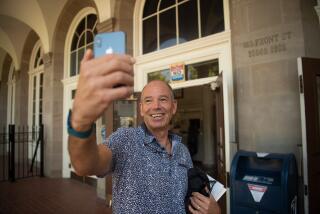CEO Gentry Underwood on Mailbox (and why you have to wait for it)
PALO ALTO -- How frustrated are people with trying to use email on their mobile devices?
The overnight success of iPhone app Mailbox suggests very. Some 1.3 million people have signed up just to wait in line to get it. Some 750,000 people are managing their Gmail with it right now.
One company won’t have to wait for Mailbox. On Friday online storage company Dropbox bought Mailbox for a reported $100 million.
“Dropbox and Mailbox share the same focus: Making things we do every day easier,” Mailbox Chief Executive and co-founder Gentry Underwood said.
People already had a hate relationship with email, and they have developed a range of mechanisms to cope with its daily onslaught. They take sabbaticals from email, sending an automated bounce message that recommends trying again later. Others opt for the more radical approach of declaring email bankruptcy and nuking everything in their inbox so they can start over.
Some have multiple email accounts so they won’t miss messages from the people who matter most. A few just swear off email altogether. Retired Stanford computer science professor Donald E. Knuth started using email in 1975 and stopped cold turkey in 1990.
But what was already a scourge of the personal computer is even worse on mobile phones.
According to Underwood, the three main problems with email are: We get too much of it we don’t care about, many emails are too long and convoluted and most email clients are “awful.”
Mailbox gives people simple, easy tools to perform email triage. Mailbox lets you quickly swipe to archive, delete or file messages or add them to lists “to read” or “to buy.” You can also “snooze” an email: it disappears from your inbox and comes back later that day, on the weekend or the following week.
“On the one hand, there is a constant incoming flow of emails but, on the other hand, email messages vary in their relevance, timeliness, and importance,” Cornell University communications professor Natalie Bazarova said. “Part of the appeal of the Mailbox app is that it attempts to tackle the problem of email overload and information management by giving users a tool to sort emails based on their relevance, timeliness, and importance.”
One of most addictive parts of Mailbox is achieving “inbox zero.” Underwood said 30% of Mailbox users empty their inboxes every week. They are rewarded with the message: “You’re all done” and a photograph that conveys a Zen-like peace of mind — even if it’s fleeting.
Mailbox users proudly post screenshots of their empty inboxes on Twitter. Underwood chuckles, remembering one tweet in particular: “BOOM. #inboxzero via @Mailbox.” He favorited the tweet, which promptly sent an email notification to the Mailbox user’s inbox much to her dismay. “Oh wait, you just spoiled my squeaky clean inbox!” she replied.
“So I favorited that tweet too,” Underwood said.
Mailbox came up with an unusual system to make sure the app didn’t crash under the weight of all the new users. When you download the app, you don’t get it right away, instead you make a reservation. It’s like taking a number at a deli counter. A countdown lets you see how many people are in front of you and how many behind you — but not how long you will have to wait. You get a push notification when your Mailbox is ready.
Underwood sat down with me a couple of weeks ago for more than an hour to discuss the reservation system, why email is broken and what Mailbox is trying to do about it. He also said Mailbox is trying to get Mailbox in everyone’s hands and on their iPhones. Here’s a condensed version of our conversation.
ALSO:
Dropbox buys maker of popular email improvement app Mailbox
More to Read
Inside the business of entertainment
The Wide Shot brings you news, analysis and insights on everything from streaming wars to production — and what it all means for the future.
You may occasionally receive promotional content from the Los Angeles Times.








